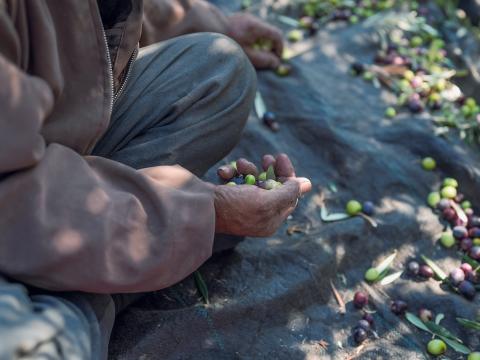West Bank families face alarming hunger and poverty crisis, new report warns

- 74% of families now live below the minimum standard of living – up from just 21% a year ago.
- 70% of children are frequently skipping meals due to rising food insecurity.
- 9% of children have dropped out of school, many because their families can no longer afford it or need them to work.
- 950% increase in the number of families reporting that a member had gone a full day without eating since 2022.
Families across the West Bank are facing an unprecedented crisis marked by hunger, poverty, and fear, according to a new report released today by World Vision. The Unseen Crisis highlights the worsening situation for children, revealing an almost tenfold increase in the number of families reporting that a member had gone a full day without eating since 2022. Three out of four households surveyed are now unable to cover their most essential needs, and half of the children are regularly skipping meals.
While global attention centres on new spikes of violence across the Middle East, families in the West Bank are facing sharp increases in hunger as their incomes collapse. The report finds that nearly three-quarters (74%) of households now live below the minimum standard of living - a dramatic jump from just 21% in 2023. Meanwhile, 64% of families have lost income due to revoked work permits, reduced wages, or shuttered businesses.
"In just over a year, an unprecedented economic crisis has upended the lives of children in the West Bank. The speed and scale of this collapse – unfolding with little notice from critical stakeholders – is deeply alarming. The international community must act urgently to address the needs of Palestinian children. An entire generation is at risk.” Kristen Phelps, National Director, World Vision West Bank - Jerusalem
According to the report findings, many children in West Bank are now working to support their families, most of them are facing major challenges to continue their education and basic healthcare is becoming out of reach for many households. Seventy percent of children surveyed said they are skipping meals frequently, and nearly half had done so more than 10 times in a single month. In Hebron, the situation is even worse, with 68% of children regularly going without food.
Families are running out of options and school attendance is also falling as families struggle to meet basic costs or fear for their children’s safety. Nine percent of children have already dropped out, while 37% of communities report declining attendance. In many cases, children are sent to work instead of school, as parents face impossible choices.
“This rapid deterioration is not just a statistic; this crisis is stealing children’s futures,” said Phelps. “We are hearing from families who are skipping meals, pulling their children from school, and living in constant fear. The world cannot ignore what is happening.”
Children’s physical and mental health is also suffering. One in five children have gone without health care or medication and 1 in 4 families observed behavioural changes linked to fear, anxiety, or trauma. Economic strain and exposure to violence are robbing children of their sense of safety and hope.
“Children across the Middle East desperately need an end to the fighting,” added Eleanor Monbiot, Regional Leader, World Vision Middle East and Eastern Europe. “Amidst the crises, children in West Bank are being forgotten. We have been working in some of these communities for decades, and the levels of violence, hunger and abuse are unfortunately the highest I have ever seen. We need urgent action to end hostilities, restore economic growth and support families to recover, protect children’s rights, and restore their hope.”
ENDS
About the report
The Unseen Crisis report is based on a broad-based community listening survey conducted with 2,511 individuals between November 2024 and January 2025, which sought to uncover how families are coping and what they need most. By engaging with parents, children, community leaders, and local volunteers, the assessment paints a sobering picture of daily life under crisis and offers a platform to elevate the voices of those most affected.
About World Vision
World Vision is a relief, development and advocacy organisation dedicated to working with children, families, and their communities to reach their full potential by tackling the root causes of poverty and injustice. We work with the world’s most vulnerable people from all backgrounds, even in the most dangerous places, and serve all people, regardless of religion, race, ethnicity, or gender.
World Vision has been operating in the occupied Palestinian territories (oPt) since 1975. Since then, the organisation has developed one of the most extensive community-based presences amongst organisations operating in the West Bank, with 90 dedicated staff and more than 300 volunteers.
Since October 2023, World Vision has implemented an emergency response across the whole of the West Bank focusing on protection, food security, mental health, access to healthcare and access to safe education. Over the last 18 months, more than 480,000 people benefited from our humanitarian programmes.
For more information, please visit https://www.wvi.org/emergencies/middle-east-crisis-response